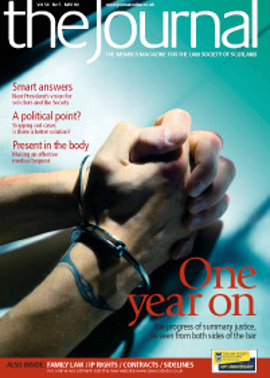A place in the sun?

All family lawyers should now be aware (and wary) of the invasive reach of legislation from Brussels. Most are familiar with the European regulation governing jurisdiction for divorce purposes (known as “Brussels II-bis”). However, there remain important, and unanswered, questions regarding the interpretation of parts of this regulation. One such question concerns “habitual residence”.
Conclusive guidance can of course only be provided by the European Court, but the case of Williamson v Williamson (Kirkcaldy Sheriff Court,6 March 2009, available on www.scotcourts.gov.uk) may assist Scottish practitioners to a certain extent. It is important to note, however, that it is currently subject to appeal, so this may not be the final word on the matter.
Williamson examined (1) the interpretation to be given to “habitual residence” for the purpose of Brussels II-bis; and (2) the interaction of Brussels II-bis with the old “40 day rule” in the sheriff court.
The case turned on whether the Scottish court had jurisdiction to deal with the divorce, or matters should proceed in Spain. The ground relied on by the pursuer was: “the applicant is habitually resident if he or she resided there for at least six months immediately before the application was made and… has his or her domicile there”.
With regard to domicile, the defender, Mrs Williamson, claimed that parties had emigrated permanently to Spain in February 2006, and had remained there since. The pursuer stated that although they had a Spanish property, where they spent considerable time, this was primarily a holiday home. He continued to operate his business in Scotland, he had a place of residence here, and his family were here. He had not obtained the necessary “tarjeta de residencia” (residence permit) in Spain. He could only speak basic Spanish, and his few friends in Spain were British ex-pats. This evidence was preferred, and the issue of domicile determined in his favour.
The more novel question was whether Mr Williamson was “habitually resident“ in Scotland for the purpose of Brussels II-bis.
The pursuer relied on the English case of Marinos [2007] EWHC 2047 (Fam), along with the explanatory report to the regulation, and European Court case law regarding the interpretation of “habitual residence” in the context of other EU regulations. In line with these authorities, the sheriff held that there was an autonomous EU definition of “habitual residence”, being: “the place where the person has established, on a fixed basis, his permanent or habitual centre of interests, with all the relevant facts being taken into account for the purpose of determining such residence”.
In addition, the sheriff held that it was not necessary for the pursuer to be habitually resident for the entire period of six months. Instead, the regulation requires an applicant to be habitually resident only at the time of raising the action; only residence (not habitual residence) is required for the preceding six months.
It was agreed that Mr Williamson had spent roughly equal periods in Scotland and Spain during the preceding six months. The defender argued that as the pursuer had not spent that period entirely in Scotland, he could not establish that he was resident here. The sheriff however held that “it is entirely logical that a person can be resident in more than one place at a time” – and in this case, the pursuer was resident in both Scotland and Spain. Accordingly, the habitual residence and six-month residence requirements were both satisfied.
This was not the end of the matter, due to the rule in the 1973 Act requiring residence in the sheriffdom for 40 days prior to the raising of the action. It was accepted that Mr Williamson had spent time in Spain during that period. The defender argued that one had to be physically in the sheriffdom for the whole period. The sheriff, however, held that “resident” must be given its ordinary and natural meaning, and that it would be illogical and unnatural to read this as requiring physical presence over the whole period.
In addition, the sheriff looked at the intent behind the 1973 Act, which he held was presumably to provide sufficient linking factors with the sheriffdom where the action was raised: “All that the 1973 Act does is indicate which sheriffdom is the correct one, after the basic principle of jurisdiction is established. In any conflict between the 1973 Act and Brussels II-bis, the European regulation must take precedence. I have found that jurisdiction in Scotland has been established, and it would be illogical to deprive a litigant from pursuing an action in the sheriff court, as opposed to the Court of Session, due to a domestic regulation which has its historical origins in a different culture, and under a different prevailing legal framework”.
Could this be another victory for Brussels over domestic law?
In this issue
- Obama's first 100 days
- Playing politics with the Scottish constitution
- Beneficiaries are suffering from the high cost of advice
- Ever forwards
- Shared principles
- A year of debate
- Ask the audience
- Property sales continue to fall
- Where fact makes law
- Giving up the body
- Playing politics with the constitution
- Matrix evolutions
- Make it happen
- View from the top
- Retiring thoughts
- Law reform update
- Phone a friend
- Lighting the way
- Is Big Brother watching too closely?
- Ask Ash
- Selection, the professional way
- A claims pandemic?
- Bumper crop
- A place in the sun?
- Equality redefined
- Taking diligence forward
- Scottish Solicitors' Discipline Tribunal
- Book reviews
- Website review






